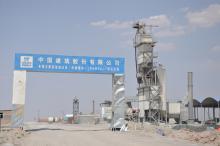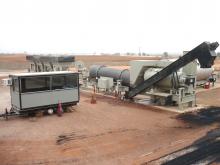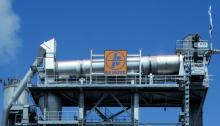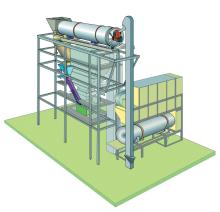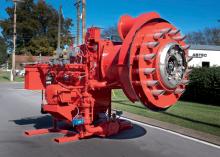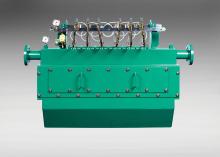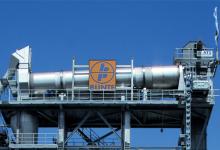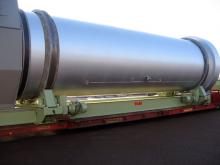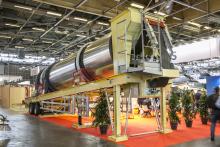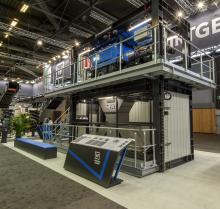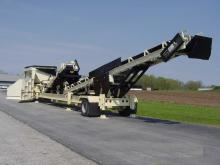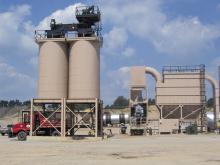An asphalt plant has several key functions and is designed to accurately dose the aggregates and asphalt to ensure the correct proportions, as established in the mix. The plant should dry and heat the aggregates completely, regardless of their nature and characteristics, in order to obtain perfect adhesiveness with the asphalt binder. The drying system’s combustion gases have to be filtered so that fine aggregates transported by these gases can be returned to the mixer. The plant mixes the aggregates from the dryer and the fine aggregates from the bag filter with heated asphalt in the tank, occasionally introducing additives to the mix as required. Once this material has been mixed thoroughly it can be moved to a storage silo for subsequent loading into trucks and transport to the jobsite. These processes can be carried out in various ways, depending on the type of plant and will have an impact on product quality and production costs.
One of the goals is to produce the mix with the same quality as from a laboratory, where conditions are controlled and the production rate is lower. Another key aim is to produce this mix at the lowest possible cost. However, the technologies used for dosing materials and drying the aggregates have a significant impact on output quality and production costs.
In terms of costs, a study conducted by application engineers from
The cost of purchasing the input material was calculated according to the current situation in Brazil. Maintenance costs were determined according to the cost of the wear parts and the wear life of these parts. Infrastructure costs included the price of a piece of land in a rural zone with the area needed to install the machinery and build the necessary infrastructure for the operation. Electricity costs were based on the estimated energy demand of the equipment and local price was set by the electric utility companies. The wheeled loader is based on market price with interest and depreciation calculated under the same conditions established for the plant. Manpower was estimated according to need during the operation of the plant, management and administrative needs.
The main opportunities to reduce production costs are in the dosing and drying stages. This can be achieved through accurate dosing of aggregates and bitumen, as well as in achieving optimum combustion and maximum heat exchange between the combustion gases and aggregates, lowering fuel consumption.
The dosage can have relevant financial impacts as the binder represents more than 50% of total costs. The figures Ciber use are based on a cost/tonne of asphalt of US$600 with freight included and a 5% content of bitumen in the mix. To produce 100,000tonnes/year, bitumen consumption in this period would be 5,000tonnes at a cost of $3,000,000. With variations of +0.1%, +0.2% and +0.3% of bitumen in the mix, there are key financial implications. Based on an absolute mean variation of 0.3% of bitumen, the increase in production costs after 10 years comes to $1,800,000.
Asphalt plants must have technologies that ensure accuracy in the dosing of materials. Marcelo Zubaran, application engineer and expert in products from Ciber Equipamentos Rodoviários, part of the
However external factors, such as incorrect measurement of aggregates or contamination between silos, can lead to dosing errors. According to Zubaran, "if the plant regularly receives information on the humidity of the aggregates and if aggregates are not contaminated between silos, the mix will come out perfect, since the plant will certainly have done its part."
Fuel has a major impact on production costs, especially for drying aggregates. New technologies can ensure a better heat exchange between the aggregates and combustion gases, potentially reducing fuel consumption by up to one litre/tonne produced. A substantial reduction in fuel expenditures can be achieved/year, based on an annual production of 100,000tonnes and cost of fuel at $1/litre.
However, sophisticated plants may offer a significant return on investment in terms of savings, production yield, final product quality and lower fuel, aggregate and asphalt costs. This can deliver a better overall economic proposition than opting for a less costly plant with a lower level of technology.
ADM’s heavy-duty tanks
Asphalt Drum Mixers is now offering sophisticated asphalt tanks as an economical way to store and monitor liquid material. The firm says that it designs the units with a serpentine coil arrangement to provide a heat exchange area of more than 111.5m2, as this ensures consistent temperatures throughout the tank. The tanks are available in vertical or horizontal/portable configurations and are compatible with
The high-efficiency, hot-oil heater includes a fully jacketed firebox, multipass fire-tube heat exchanger and a 318litre thermal expansion tank. The system also incorporates a powerful, pre-packaged burner assembly. Other standard features include a combustion air fan, fuel oil pump and No 2 fuel oil manifold with safety shutoff valves.
ADM includes a tank-mounted, weatherproof control panel standard on both the vertical and horizontal/portable tanks. Panel features include a main power disconnect, motor start relays, circuit breaker protection, burner controls, automatic temperature controller, high temperature limit, flame signal relay, status indication lights and alarm circuitry.
Taking the RAP
A Chinese road builder is planning to add recycling capabilities to existing asphalt-mixing plants to meet new environmental guidelines. And this new approach by the firm is also expected to make a significant reduction in materials costs as well.
CSCEC Road & Bridge is a successful business and has won more than 20 national and provincial awards and has completed more than 1,000 key projects globally.
The company is using
Yet success in China is increasingly being defined by more than just high production rates. “In recent years, as more and more public-private partnerships are coming out, we also are paying more attention to recycling technology,” said Zhou Shixin, chairman of a CSCEC Road & Bridge branch in Shijiazhuang City.
The company operates four productive Ammann UniGlobe plants that have a great deal of life left in them. The need to meet China’s latest requirements on the reuse of asphalt has led CSCEC Road & Bridge to plan to add recycling capabilities to those existing plants.
The improvement includes the addition of an RAH drum that heats the RAP before depositing it in the mixer. RAP needs the separate RAH drum because it must be gently preheated. This is because bitumen in the RAP is damaged when overheated. The bitumen is valuable, and preserving it is a cost saver.
After preheating, the RAP is deposited in the mixer, where it is blended with the hot virgin aggregate and the result is a quality mix with a high percentage of recyclables.
Ammann is often able to complete the plant upgrade work in the off-season, as this better suits customer needs. “We do not have much work in winter, and we can add the RAP system then,” Zhou said.
Adding the RAP capability is considerably less expensive than purchasing a new plant, Zhou said. And CSCEC Road & Bridge’s recycling capabilities are expected to be fully operational in March 2018.

